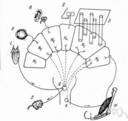Although I am a strict
behaviorist in the Skinnerian tradition, I
Steve Diller, animal
behaviorist, of the Center for Animal Behavior and Canine Instruction in Elmsford, NY, says "no one answer works for all dogs." But rather than scream, panic, or run, Diller says freeze.
Prior to 1989, the school principal and a handful of teachers recognized the problematic nature of direct,
behaviorist theory based instruction for mathematics.
Former SEGA designer Malt Wolf consulted with a cat
behaviorist to create the ultimate cat arcade.
And the science of psychology on the
behaviorist model was you were going to correlate these stimulus inputs with the behavioral outputs.
Locating behaviourism's roots in the pragmatism of the Progressivist movement, the objectivism of the newly emerging and institutionalized social sciences, and the philosophical functionalism of the New Realists, Mills writes that "American psychologists welcomed them [various
behaviorist positions] not because they were novel or because they were familiar" (p.
Such knowledge may have been helpful to Murray in formulating his insights; but his analysis of characters' motivations - why they say what they do, what their language may or may not disclose, what determines their engagement with or detachment from their roles - owes as much to old-fashioned close reading as to
behaviorist theory.
In this regard, Robert Pincus-Witten's article "Bruce Nauman: Another Kind of Reasoning" (published in Artforum in February 1972), which reproached the artist for turning away from the wordplay featured in his earlier works toward "phenomenological," indeed "
behaviorist," pieces, should be reread in light of the past two and a half decades of Nauman's production.
Regularization was particularly visible in the 1920s and 1930s, when the
behaviorist approach of psychologist John Watson heavily influenced popular advice.
For example, compared with humans, dogs are "far superior at tracking down odors," says Marian Bailey, an animal
behaviorist at Henderson State University in Arkansas.
Counseling and psychotherapy do work, but they work because of factors such as the personal qualities of the therapist and the expectations of the person undertaking therapy, not because of specific psychoanalytic,
behaviorist, or cognitive therapy belief systems.
The leading proponent of behaviorism -- the belief that man is controlled by external factors and that autonomy and free will do not exist -- in such books as the novel Walden Two (1948) and Beyond Freedom and Dignity (1971), Skinner attempted to show how
behaviorist principles could be applied to create an ideal society.
 behaviorist - a psychologist who subscribes to behaviorism
behaviorist - a psychologist who subscribes to behaviorism behaviorist - of or relating to behaviorism; "behavioristic psychology"
behaviorist - of or relating to behaviorism; "behavioristic psychology"